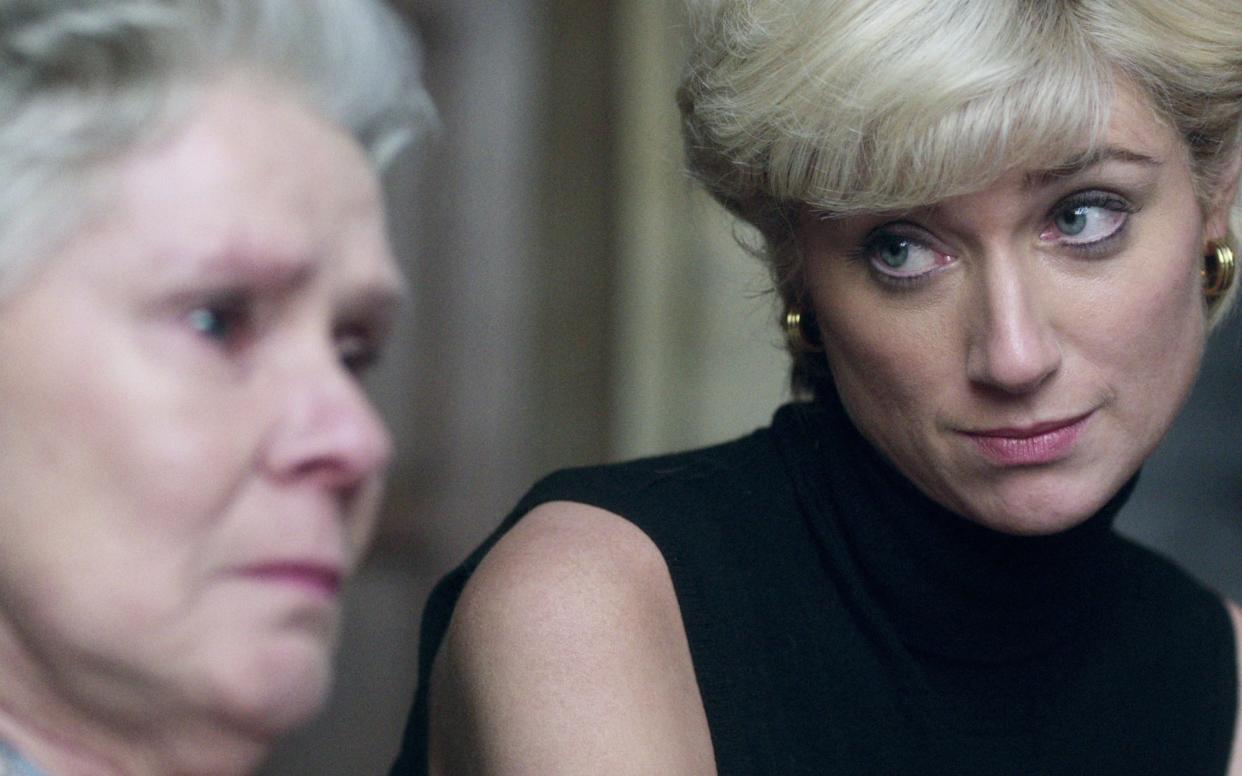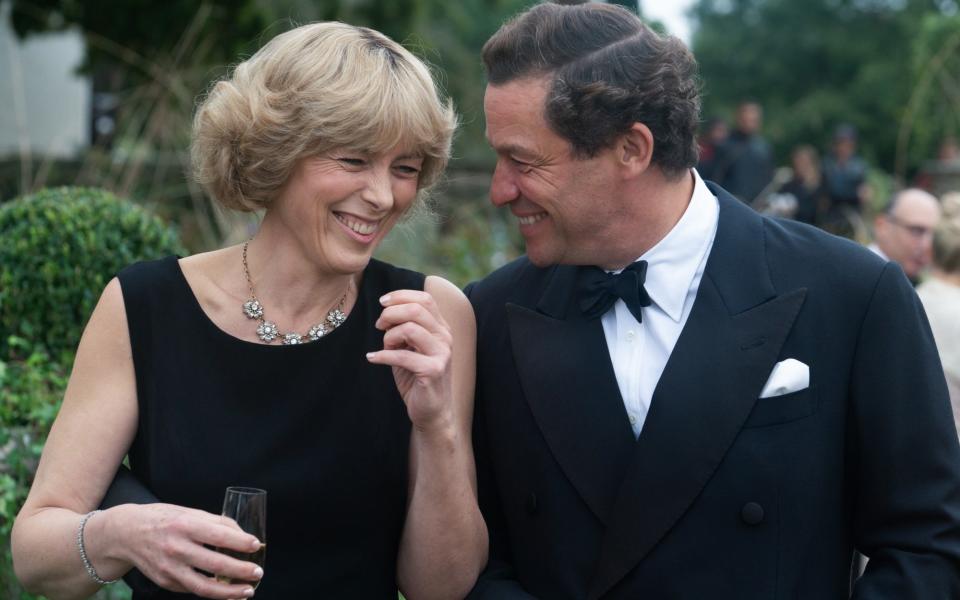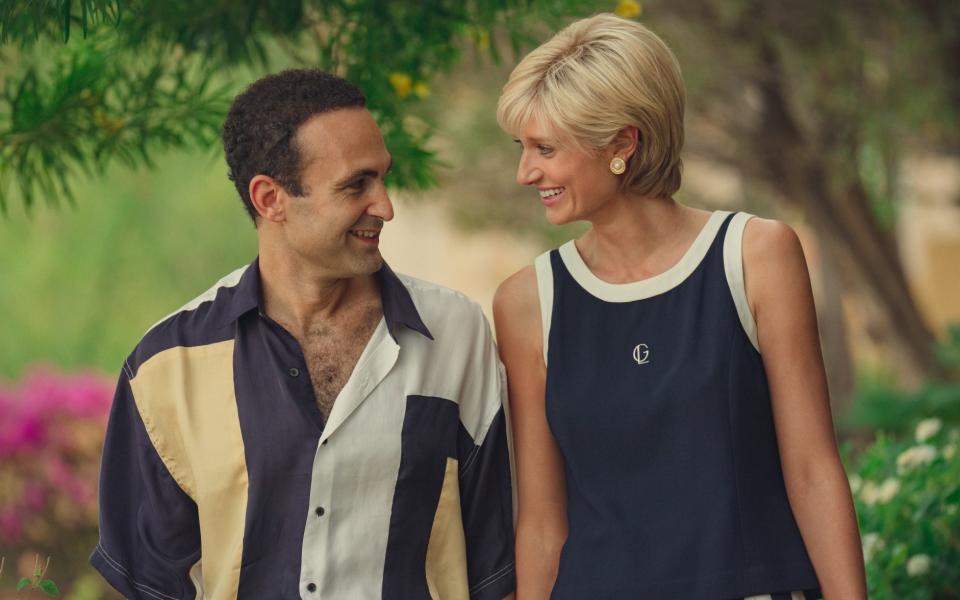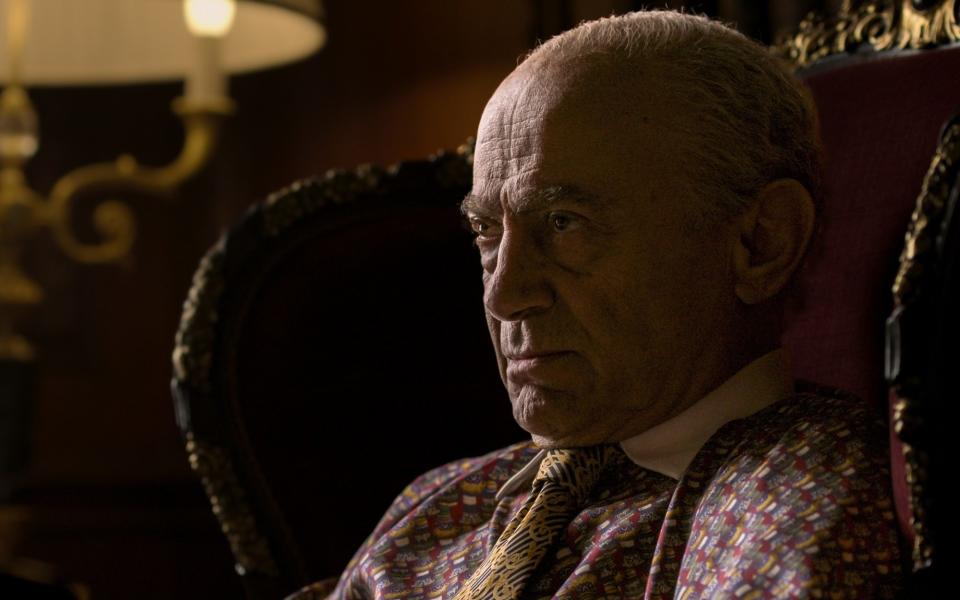The Crown, season 6, review: the show reaches a creative dead end with Diana's ghostly return

Warning: this review contains spoilers
Diana dies in the final season of The Crown, but that doesn’t mean she leaves. So vital has the Princess of Wales become to the Netflix drama that the show can’t manage without her: she appears as a sort of ghost, materialising on the plane home from Paris to comfort a distraught Prince of Wales, and on the sofa at Balmoral to give the Queen some friendly PR advice.
If that sounds like an act of desperation on the part of writer Peter Morgan – well, it is. He has written himself into a corner by bringing The Crown into 1997 and one of the most extensively covered events in British history. There is nothing we don’t know about the Princess’s death and the Royal family’s reaction to it, which leaves Morgan casting around for something to fill the episodes. Perhaps he is all out of ideas, having addressed this same period of time in his 2006 film, The Queen. But something has gone wrong, because creatively the show has atrophied.
The series is being released in two tranches – four episodes now, six more on December 14. The summer-long romance between Diana and Dodi Fayed is dragged out over three episodes. Scenes between Elizabeth Debicki and Khalid Abdalla are a sweet but plodding soap opera, mostly taking place on a superyacht in the Mediterranean and giving the costume department an opportunity to source statement swimwear.
Dodi is hopelessly under the thumb of his father, Mohammed al-Fayed, who summons him from the US and orders him to woo the princess (never mind that he is engaged to someone else). But Diana soon tires of Dodi, who has given her the ick – in Love Island parlance – by being overly attentive and writing terrible poetry. Unfortunately for her, they end up in a jewellery shop where her throwaway comment about a ring on display leads to an awkward proposal.
The sunshine of St Tropez is contrasted with rainy old Britain, where Charles is planning a 50th birthday party for Camilla at Highgrove and the Queen is at Balmoral. Dominic West has relaxed into the role of Charles and his scenes have a certain charm, especially a last (invented) encounter with Diana, in which they agree to move forward on good terms for the sake of the children. But elsewhere he is petulant and jealous, exploding at PR flunkeys when he sees that Diana is getting more press than Camilla: “I don’t want partial, qualified victory. This is war! Only total victory will do.” Only TV characters talk like this.

The Crown completes its demolition job on the late Queen’s character, a six-series arc which has taken us from Claire Foy’s bright young woman to Imelda Staunton’s sour old boot. It started in the middle years with Olivia Colman playing the monarch as emotionally constipated. Now she is little more than a hairdo: no interior life, no personality, no intelligence. She has all the warmth of Ena Sharples but none of the wit. Mouth permanently pinched in distaste, she is unable to show affection to her son and unwilling to accept the public’s love for Diana.
Even when the Queen expresses concern for her grandsons – “those poor boys” – it is without any of the tenderness she displays for her corgis. Duty and protocol come above all else, and in this she is backed by the uncompromising Duke of Edinburgh (Jonathan Pryce, excellent as ever). They appear to lack normal human feeling. When Charles asks if he can use the royal plane to fly Diana’s body back from Paris, Philip refuses on the grounds that she was “no longer HRH”. They give in when Charles asks if they would prefer her to come back in a Harrods van. Later, Charles refers to Diana as being “part of this family”. “Divorced from this family,” corrects the Queen, icily.
There is no sense that she is wrestling with any of these decisions, but every so often Morgan’s script demands that she change tack. Uninterested in the real reasons for the Queen returning to Buckingham Palace to address the nation, he sends in Diana, who appears as a figment of the monarch’s imagination. “For as long as anyone can remember, you’ve taught us what it means to be British. Maybe it’s time to show you’re ready to learn too,” says Dead Diana, who has suddenly acquired all the wisdom and calm that she failed to display in life.

When Diana appears to Charles from beyond the grave – announcing herself with a little, “Ta-da!” – it is to tell him how much she enjoyed his sobbing over her body in the hospital morgue. “Thank you for how you were at the hospital. So raw. Broken. And handsome. I’ll take that with me.” What an odd thing for Morgan to write.
It’s hard to escape the suspicion that the writer has real contempt for this family. The sixth series is at its best when it moves away from the royals themselves. In episode two, actor Enzo Cilenti peps things up as Mario Brenna, the slick Italian paparazzo who made millions by snapping pictures of Dodi and Diana kissing on board the yacht. Brenna is the closest this series comes to fun.
Then there are the Fayeds. Salim Daw, the best thing here, is terrific at showing us the different sides of Mohamed al-Fayed: monstrous, bullying, a proud man who feels genuine hurt at being snubbed by the Establishment, and ultimately a heartbroken father. But he is set up as the villain. He orchestrates the Diana and Dodi affair, masterminds the proposal and insists the couple go to Paris. With all the main players dead, who knows how much of this is true? As Dodi, Abdalla is an enormously sympathetic character, cowed by his controlling father and unable to break out on his own. He also comes back for a chat after his death, because someone clearly thinks the ghost idea is a brilliant one.
The drama trudges towards its terrible conclusion. In its most heart-rending scene, Diana has a last phone call with her boys, promising to see them the next day. The chaos of Diana and Dodi’s final day in Paris is conveyed. We see Diana dressed in that last outfit of white jeans and black jacket, entering the Ritz through the revolving door.

There are no scenes inside the Pont de l’Alma tunnel: we cut from the sound of the crash to the phone ringing at Balmoral. The decision has been made to dub out all dialogue in which someone breaks the news of Diana’s death; their mouths move in silence, and we focus on the reactions. Why do this? If it’s for reasons of taste, then why have the camera capture the bewildered face of little Harry as he mouths the word “no”? Good taste would mean leaving this scene to our imagination, rather than intruding upon the worst moment of someone’s life for the purpose of entertainment.
When set against real-life events, The Crown’s dramatic reconstructions feel limp. The sight of William and Harry walking forlornly behind their mother’s coffin in news coverage from that day is still wrenching. Here, shot in close-up, it barely registers. Morgan has to invent lines of dialogue to give the scene more emotional power. “Why are they crying for someone they never knew?” William asks the Duke of Edinburgh. “They’re not crying for her,” Philip replies, “they’re crying for you.”
There are six more episodes to go. The show may redeem itself dramatically by widening the scope – it will cover William and Kate’s early relationship, the death of Princess Margaret and the wedding of the now King and Queen. Perhaps the Queen will be redeemed and reach a new understanding with Charles. But releasing these four instalments alone is an error, and the fourth (titled Aftermath) is the weakest of the lot. It ends on a note so bizarre that I won’t reveal it here, for fear of spoiling the effect. If you make it that far, you’ll be glad of the laugh.
Recommended
The Crown season 6 episode 1 review: the tragedy begins with cat-and-mouse games ★★★☆☆

 Yahoo News
Yahoo News 
